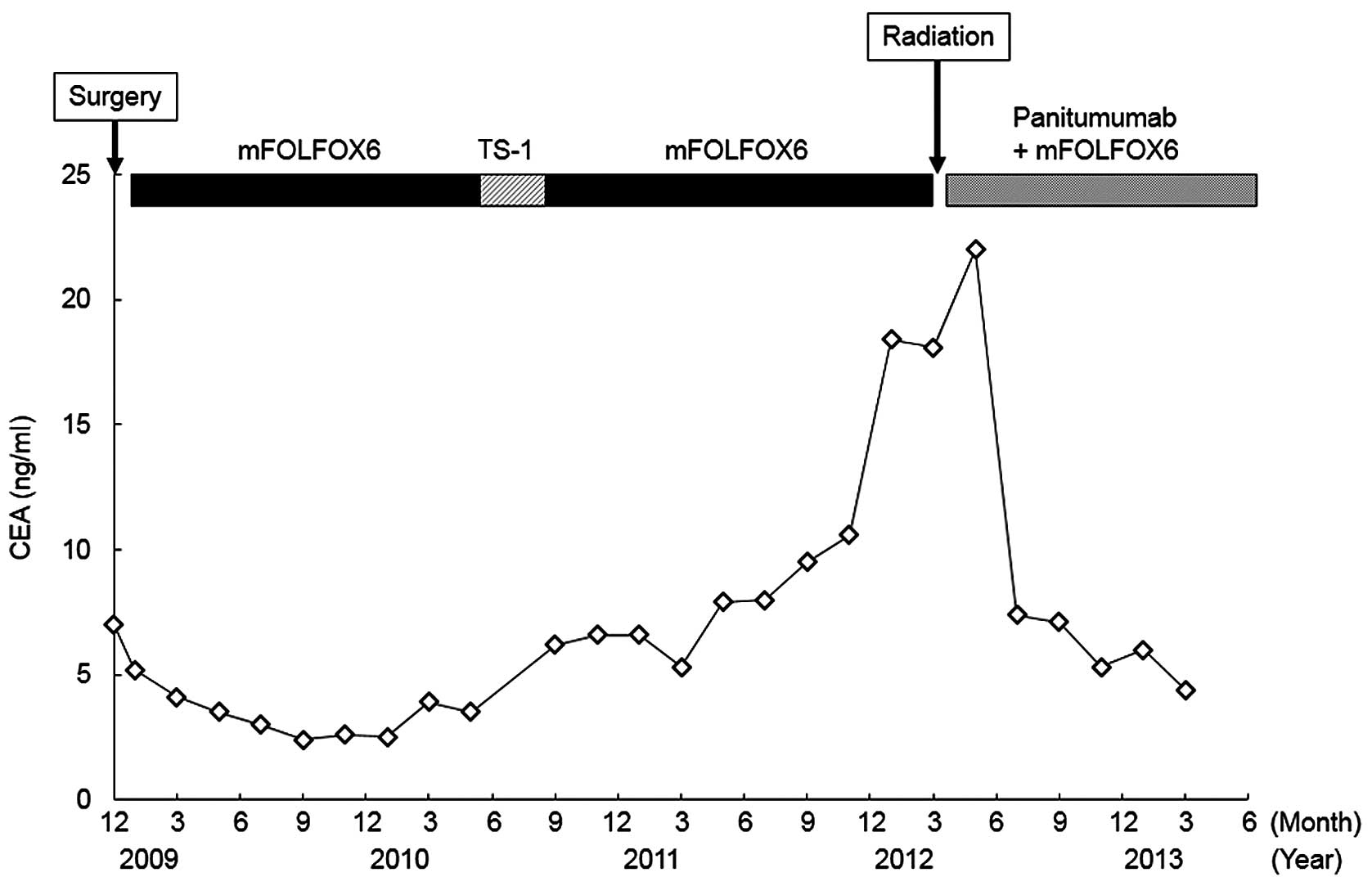|
1
|
de Gramont A, Figer A, Seymour M, et al:
Leucovorin and fluorouracil with or without oxaliplatin as
first-line treatment in advanced colorectal cancer. J Clin Oncol.
18:2938–2947. 2000.
|
|
2
|
Goldberg RM, Sargent DJ, Morton RF, et al:
A randomized controlled trial of fluorouracil plus leucovorin,
irinotecan, and oxaliplatin combinations in patients with
previously untreated metastatic colorectal cancer. J Clin Oncol.
22:23–30. 2004. View Article : Google Scholar
|
|
3
|
André T, Boni C, Mounedji-Boudiaf L, et
al: Oxaliplatin, fluorouracil, and leucovorin as adjuvant treatment
for colon cancer. N Engl J Med. 350:2343–2351. 2004.
|
|
4
|
Watson MA, Stewart RK, Smith GB, Massey TE
and Bell DA: Human glutathione S-transferase P1 polymorphisms:
relationship to lung tissue enzyme activity and population
frequency distribution. Carcinogenesis. 19:275–280. 1998.
View Article : Google Scholar
|
|
5
|
Tournigand C, Cervantes A, Figer A, et al:
OPTIMOX1: a randomized study of FOLFOX4 or FOLFOX7 with oxaliplatin
in a stop-and-Go fashion in advanced colorectal cancer - a GERCOR
study. J Clin Oncol. 24:394–400. 2006. View Article : Google Scholar
|
|
6
|
Hosokawa A, Ogawa K, Ando T, et al:
Preventive effect of traditional Japanese medicine on neurotoxicity
of FOLFOX for metastatic colorectal cancer: a multicenter
retrospective study. Anticancer Res. 32:2545–2550. 2012.
|
|
7
|
Grothey A, Nikcevich DA, Sloan JA, et al:
Intravenous calcium and magnesium for oxaliplatin-induced sensory
neurotoxicity in adjuvant colon cancer: NCCTG N04C7. J Clin Oncol.
29:421–427. 2011. View Article : Google Scholar : PubMed/NCBI
|
|
8
|
Sakurai M, Egashira N, Kawashiri T, Yano
T, Ikesue H and Oishi R: Oxaliplatin-induced neuropathy in the rat:
involvement of oxalate in cold hyperalgesia but not mechanical
allodynia. Pain. 147:165–174. 2009. View Article : Google Scholar
|
|
9
|
Grolleau F, Gamelin L, Boisdron-Celle M,
Lapied B, Pelhate M and Gamelin E: A possible explanation for a
neurotoxic effect of the anticancer agent oxaliplatin on neuronal
voltage-gated sodium channels. J Neurophysiol. 85:2293–2297.
2001.
|
|
10
|
Wang L, McLeod HL and Weinshilboum RM:
Genomics and drug response. N Engl J Med. 364:1144–1153. 2011.
View Article : Google Scholar
|
|
11
|
Moscow JA, Fairchild CR, Madden MJ, et al:
Expression of anionic glutathione-S-transferase and P-glycoprotein
genes in human tissues and tumors. Cancer Res. 49:1422–1428.
1989.PubMed/NCBI
|
|
12
|
Goto S, Iida T, Cho S, Oka M, Kohno S and
Kondo T: Overexpression of glutathione S-transferase pi enhances
the adduct formation of cisplatin with glutathione in human cancer
cells. Free Radic Res. 31:549–558. 1999. View Article : Google Scholar : PubMed/NCBI
|
|
13
|
Stoehlmacher J, Park DJ, Zhang W, et al:
Association between glutathione S-transferase P1, T1, and M1
genetic polymorphism and survival of patients with metastatic
colorectal cancer. J Natl Cancer Inst. 94:936–942. 2002. View Article : Google Scholar : PubMed/NCBI
|
|
14
|
Chen YC, Tzeng CH, Chen PM, et al:
Influence of GSTP1 I105V polymorphism on cumulative neuropathy and
outcome of FOLFOX-4 treatment in Asian patients with colorectal
carcinoma. Cancer Sci. 101:530–535. 2010. View Article : Google Scholar : PubMed/NCBI
|
|
15
|
Hong J, Han SW, Ham HS, et al: Phase II
study of biweekly S-1 and oxaliplatin combination chemotherapy in
metastatic colorectal cancer and pharmacogenetic analysis. Cancer
Chemother Pharmacol. 67:1323–1331. 2011. View Article : Google Scholar : PubMed/NCBI
|
|
16
|
Lecomte T, Landi B, Beaune P, Laurent-Puig
P and Loriot MA: Glutathione S-transferase P1 polymorphism
(Ile105Val) predicts cumulative neuropathy in patients receiving
oxaliplatin-based chemotherapy. Clin Cancer Res. 12:3050–3056.
2006. View Article : Google Scholar : PubMed/NCBI
|
|
17
|
Paré L, Marcuello E, Altés A, et al:
Pharmacogenetic prediction of clinical outcome in advanced
colorectal cancer patients receiving oxaliplatin/5-fluorouracil as
first-line chemotherapy. Br J Cancer. 99:1050–1055. 2008.
|
|
18
|
Goekkurt E, Al-Batran SE, Hartmann JT, et
al: Pharmacogenetic analyses of a phase III trial in metastatic
gastroesophageal adenocarcinoma with fluorouracil and leucovorin
plus either oxaliplatin or cisplatin: a study of the
arbeitsgemeinschaft internistische onkologie. J Clin Oncol.
27:2863–2873. 2009. View Article : Google Scholar
|
|
19
|
Grothey A, McLeod HL, Green EM, et al:
Glutathione S-transferase P1 I105V (GSTP1 I105V) polymorphism is
associated with early onset of oxaliplatin-induced neurotoxicity. J
Clin Oncol. 23(Suppl 1): abstr 3509. 2005.
|
|
20
|
Ruzzo A, Graziano F, Loupakis F, et al:
Pharmacogenetic profiling in patients with advanced colorectal
cancer treated with first-line FOLFOX-4 chemotherapy. J Clin Oncol.
25:1247–1254. 2007. View Article : Google Scholar
|
|
21
|
Kanai M, Yoshioka A, Tanaka S, et al:
Associations between glutathione S-transferase pi Ile105Val and
glyoxylate aminotransferase Pro11Leu and Ile340Met polymorphisms
and early-onset oxaliplatin-induced neuropathy. Cancer Epidemiol.
34:189–193. 2010. View Article : Google Scholar
|
|
22
|
Gamelin L, Capitain O, Morel A, et al:
Predictive factors of oxaliplatin neurotoxicity: the involvement of
the oxalate outcome pathway. Clin Cancer Res. 13:6359–6368. 2007.
View Article : Google Scholar
|
|
23
|
Kweekel DM, Gelderblom H, Antonini NF, et
al: Glutathione-S-transferase pi (GSTP1) codon 105 polymorphism is
not associated with oxaliplatin efficacy or toxicity in advanced
colorectal cancer patients. Eur J Cancer. 45:572–578. 2009.
View Article : Google Scholar : PubMed/NCBI
|
|
24
|
Inada M, Sato M, Morita S, et al:
Associations between oxaliplatin-induced peripheral neuropathy and
polymorphisms of the ERCC1 and GSTP1 genes. Int J Clin Pharmacol
Ther. 48:729–734. 2010. View
Article : Google Scholar : PubMed/NCBI
|
|
25
|
Elsby R, Kitteringham NR, Goldring CE, et
al: Increased constitutive c-Jun N-terminal kinase signaling in
mice lacking glutathione S-transferase Pi. J Biol Chem.
278:22243–22249. 2003. View Article : Google Scholar : PubMed/NCBI
|
|
26
|
Grothey A and Sargent D: Overall survival
of patients with advanced colorectal cancer correlates with
availability of fluorouracil, irinotecan, and oxaliplatin
regardless of whether doublet or single-agent therapy is used first
line. J Clin Oncol. 23:9441–9442. 2005. View Article : Google Scholar
|

















